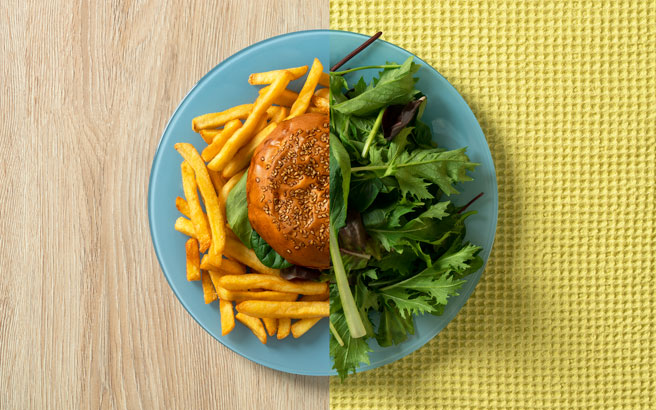 Clare Collins, a Professor of Nutrition at the University of Newcastle, Australia, tells us what a balanced diet is and how we can all go about achieving one.
Clare Collins, a Professor of Nutrition at the University of Newcastle, Australia, tells us what a balanced diet is and how we can all go about achieving one.
Does a person who eats a healthy diet half the time and a not so healthy diet the other half end up with a diet that is “balanced” overall? The short answer is “no”.
So what is a “balanced diet”? Simply put, a balanced diet gives your body all the nutrients it needs to function. Guidelines for how to eat a balanced diet are usually specified in country specific nutrient intake targets: known as Dietary Reference Values (DRVs) or Nutrient Reference Values (NRVs). The amount of macronutrients (protein, fat, carbohydrate, fibre) and micronutrients (vitamins and minerals) a person needs depends on their age, sex and life stage (such as being pregnant or breastfeeding), and how physically active you are.
Eating a balanced diet is associated with better health and wellbeing. If everyone in the world was instantly able to eat a balanced diet then the risk of heart disease, type 2 diabetes and some cancers would drop dramatically, while anaemias due to deficiencies in iron and vitamin B12 intakes would become rare. Globally, a balanced diet could prevent one in five deaths – a greater reduction in mortality compared to any other risk factor, even smoking.
Type of balanced diet

While a balanced diet is important, there’s a problem. The word “balanced” conjures up images of people trying to offset the effect of eating junk food by eating a salad. Food guides are designed to help people see what is needed to have a balanced diet. These food lists are typically created alongside national dietary guidelines to help people in making healthier food choices. They provide details on the number of servings from each food group needed to meet nutrient intakes. In the UK, it’s called the Eatwell Guide. In the USA it’s called MyPlate and in Australia it’s called the Australian Guide to Healthy Eating.
All the guides encourage an increase in intakes of vegetables, fruit, wholegrains, lean sources of animal protein or vegetarian alternatives (meat, poultry, seafood, eggs, nuts, legumes) and dairy foods (cheese, milk, yoghurt) and minimal amounts of energy-dense, nutrient-poor processed foods which are typically high in added salt, sugar and fat.
The Food and Agriculture Organisation (FAO) – a UN agency – has a database of food guidelines from around the world.
Why a balanced diet is important
When your usual eating patterns are not balanced the first thing you lose is your sense of wellbeing. A recent review found that eating more fresh fruit and vegetables is strongly correlated with greater feelings of happiness, better mental health and higher levels of wellbeing. Over time, if your diet remains out of balance, signs of poor health start to develop. For example, not getting enough dietary fibre increases the chance of developing constipation, while not eating enough plant foods (vegetables, fruit, legumes, grains) increases the risk of high blood pressure. Eventually, chronic health conditions develop, including type 2 diabetes, heart disease and diet-related cancers.
How to eat a balanced diet
- Eat more nutrient-rich core foods. This includes more, and a bigger variety, of vegetables, fruit, wholegrains and lean or vegetarian sources of protein.
- Take the Healthy Eating Quiz located on the Australian website No Money No Time. Sign up to receive personalised fast and inexpensive recipe suggestions that match your personal nutrition goals, whether that is to have sharper thinking, healthier skin, or to feel more healthy.
- Plan your meals and snacks ahead of time and take food with you when you head out so you don’t get caught out hungry. It saves money and time too.
- Cook food at home more. It has been shown to be associated with more positive feelings and less worry compared to eating lots of meals away from home.
- Avoid foods that are not included in national food guides, such as highly processed packaged food items and takeaway meals, processed meat products and sugar-sweetened drinks.
Clare Collins is a Laureate Professor in Nutrition and Dietetics and Director of Research for the School of Health Sciences, College of Health, Medicine and Wellbeing at the University of Newcastle, Australia. Her research focuses on the impact of eHealth nutrition programs on food-related health across key life stages and chronic disease conditions.
